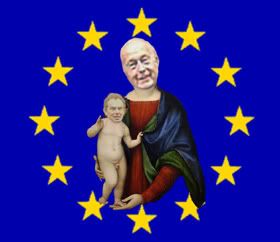Constitutional Fears

The signing of the Treaty Establishing a Constitution for Europe in October 2004 was perhaps the highlight of many EU lawyers’ (peri)(pat)(h)(etic) lives last year – present writer included.
If you follow the EU blurb/self-congratulating statements, the Constitution is presented as the product of a highly democratised and socially reflexive process, i.e. the 2002-2003 Convention on the Future of Europe. What started as a meeting aimed at addressing key questions pertaining to an enlarged Union of 27 (Bulgaria and Romania missed out in that round), ‘inevitably’ turned into the drafting of a Constitution: Valéry Giscard d'Estaing’s baby. And now we have it…
I find it fascinating how everyone and their mothers talk about it and yet so few people are aware of what is truly going on. I, on the other hand, well – I get paid to enlighten the masses and then make sure that the bright, lightning wisdom has been adequately received (i.e., exam time pursuits!).
But what do people really think about it, if they think about it at all that is?
In a brilliant talk delivered by Paul Lasok QC last night at the University of Exeter, it was claimed that the phrase "Treaty Establishing a Constitution for Europe" consists of 6 words, 3 of them uncontroversial: Treaty, a and for. I would personally beg to disagree – the word ‘Treaty’ should have probably made it into the contentious list, but I shall not bore you with legalistic technicalities on the finest points of international legal formalism. The point still very much holds true though – as Lasok poignantly observed, "There is such wide divergence in views expressed by different political leaders and commentators that one cannot but wonder whether we are all talking about the same thing!". Obvious case in point, as he put it, a recent article in one of the "UK’s most popular tabloids" (aka The Times) where Lord Rees-Mogg was questioning whether we are fools led by liars:
On the one hand we have UK Foreign Secretary Jack Straw saying that the Constitution goes "thus far and no further on European integration", effectively marking it as a boundary stone for the EU.So, which one is it?
On the other hand we have the German Minister for Europe, Hans Martin Bury, calling the Constitution "the birth certificate" of the United States of Europe.
Paul Lasok went on to provide a survey of what the Constitution actually does (yes, he had obviously read it, douez points!) and concluded that, at the end of the day, it is "old rather than new wine, perhaps in a different bottle".
But that doesn’t really appease my own fears – my fears of narrow-mindedness, concealed and-not-so-concealed bigoted dogmatism and, well, plain ignorance really. I strongly believe that the danger of ignorant people making ignorant comments leading to decisions based on ill-gotten, or worse, plainly non existing information is seriously underrated and underplayed. It is all very convenient to blame the ‘faceless, distant, bureaucrats’ sitting in their ivory Brussels towers ruling the universe (how did my darling George W put it again? – ‘Hey guys, when I need to speak to Europe, who do I call?’), but a look in the mirror would do us all good, politicians and citizens alike.
For such a breakthrough experiment in novel, suis generis transborder governance as the European Union, affecting the lives of more than 730 million people, one would think a little more interest in what’s actually going on in circles other than academia and politics would be the rule rather than the exception.
In view of Euroelections, national elections and referenda coming up, I only hope that we all become just a little bit more aware of what is actually happening and how it will – or will not, as the case may be – affect our lives.
For all others, sign up for my course – quick! Places selling like hot cakes or, should I say, gâteaux chauds…
Euroquotes on the EU Constitution at http://www.liebreich.com/LDC/HTML/Europe/05-Constitution.html






3 Comments:
Do we really want to get into the discussion of Brits in or out of the EU? I mean, they practically run the show in Brussels, they are everywhere. Think the power the use of English as a drafting language gives them!
But back to the Constitution(al Treaty)... Guess it could be both: a sum of all Treaties or the beginning of a new era. Who knows? My question has always been: What's the rush? We are experimenting here, 50 years are not enough to change the world... Baby steps would do (even if they come from Giscard's baby ;)
This comment has been removed by a blog administrator.
Well... personally, I wouldn't want anyone out who's already in and wants to be in and believes in what they're in for. I guess the true question is what does Britain really want - and, most importantly, when we talk about 'Britain wanting', who do we mean and how does one accurately and legitimately assess public sentiment?
These are hard questions.
Luckily for anyone who would like to leave, the Treaty now - for the first time - provides a formal procedure for withdrawal. In my view, that should probably be enough for the Brits to vote in support :)
(As for drafting in English, that is actually a common misconception: original drafting depends on each Institution and its particular working language(s) but, in any event, all 20 languages have equal status, representatives in all institutions are free to deliberate in any of them and official translations are provided and published simultaneously...)
Post a Comment
<< Home